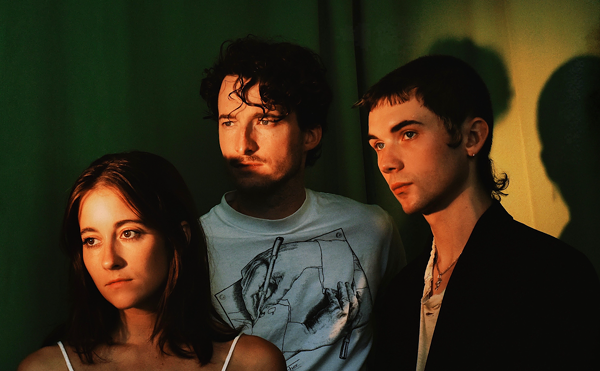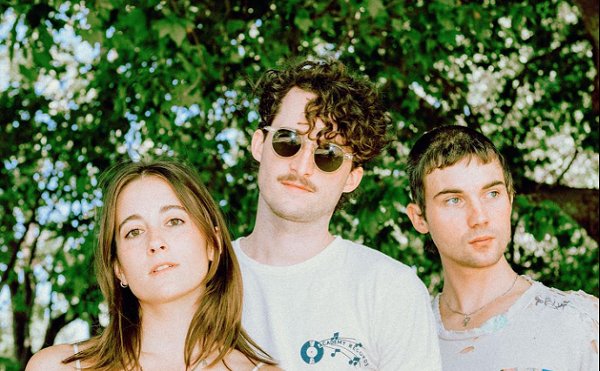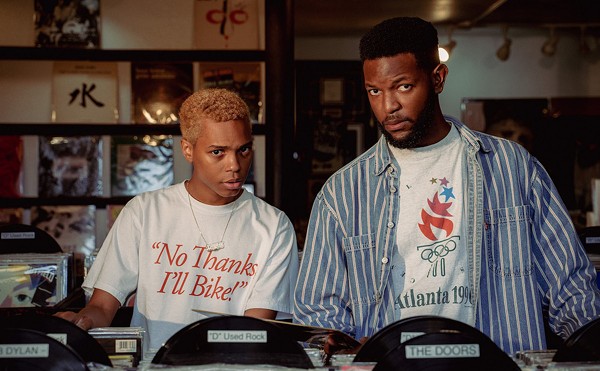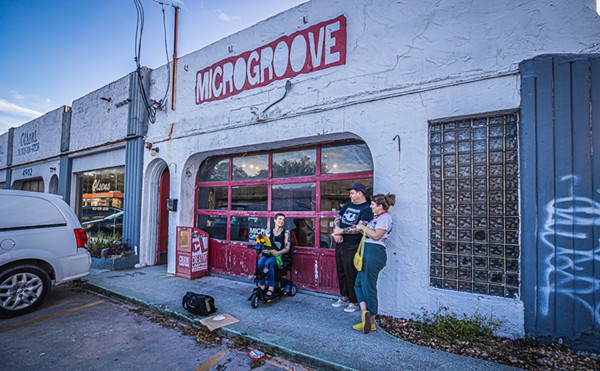The Twilight Singers Play Blackberry Belle
THE TWILIGHT SINGERS
Birdman
Former Afghan Whigs principal Greg Dulli's obsession with film is well documented — each of the three excellent albums the band released after leaving Sub Pop for the majors was consciously created with cinematic pace, atmosphere and an overarching theme. And there's a place on all three of them (Gentlemen, Black Love and 1965), usually between Acts Two and Three, where the group's trademarked dissonant R&B braggadocio and open-wound self-examination are temporarily laid aside. It's the point where nihilism gives way to the realization of potential redemption, and it's always denoted by a song that starts off low and builds masterfully to the record's most hooky, ocean-sized and string-overdubbed moments — mountainous, obvious crescendos that, above all, evoke exactly the emotions they're supposed to.
Blackberry Belle, the second full-length by Dulli's post-Whigs revolving-door recording project The Twilight Singers, works almost exclusively within that realm — but on a smaller, more intimate scale. The disc comes off more like a collection of short stories than a screenplay, but no matter how quietly or Baroquely each of these soulful, electro-enhanced tunes starts out, there almost always comes a point where things break open, where expansive, compelling new aural vistas are revealed.
The trip-hop nuances and Jacuzzi-bubbles programmed rhythms of the Twilight Singers' first outing are here cut with a generous portion of guitars and Dulli's previous confident swagger/rough-croon confessional. The listener is often forcibly reminded of his pre-Singers output (particularly on "Esta Noche," "The Killer," "Decatur Street," and "Papillon") in the best way possible. This isn't a Whigs release, though: The dense, hugely pop "Teenage Wristband" is a standout, and keys, acoustic guitars, drum machines and assorted well-laid glitches keep things interesting and original throughout.
The album's final quarter wanes sleepily. While the last three tracks are no less well conceived or executed (particularly the closing "Number Nine"), they telegraph rolling credits a bit too blatantly. But overall, Blackberry Belle ably splits the difference between the big, resonant emotions Dulli so convincingly — and theatrically — conjured with his prior rock band and the wider palette he has since employed. (www.birdmanrecords.com) 


 —Scott Harrell
—Scott Harrell
From The Ashes
PENNYWISE
Epitaph
Three guesses, and the first two don't count. It may be a little more spit-shined, overtly catchy, Bad Religion-inspired and uniformly charged by current events, but c'mon — it's a Pennywise album. Diehards will undoubtedly interpret the slightly more frequent tempo/groove shifts, sharper vocals and thicker production as symptoms of encroaching selloutitis. (Oh, and "This Is Only A Test" starts with acoustic guitar.) Some chocolate chip cookies are chewier, and some have more chips, but when you get down to it, they're still chocolate chip cookies. Pennywise have always churned out gnashing, airtight Cali fastpunk. Here's some more. Besides, even if you're one of those idiots who thinks no band ever made anything worth a shit after their first album, the bonus DVD is a must-have: lots of interview footage, lots of live footage, a tribute to Jason, and Fletcher throwing up on people (yes, that's plural). 

 1/2—Scott Harrell
1/2—Scott Harrell
1,309/Smoothed Out Slappy Hours
GREEN DAY
Lookout
Admittedly, I'm a writer who has kept the pop-punk movement at arm's length, if not held it in outright contempt, but, unqualified though I may be, it seems patently obvious that Green Day has long been the class of the genre. That they were the first of their ilk to break into the mainstream says less about their willingness to sell out than it does the overall quality of their music (consider that the rantings of an old fart who never really "got" punk, if you must).
Personally, I like the new Green Day better than the old (1994's landmark Dookie excepted), and the further they move away from the pop-punk milieu, the better (well, within limits). In keeping with full disclosure, I'd not previously heard any of 1,309/Smoothed Out Slappy Hours, which compiles the band's first full-length (1990's 39 Smooth), two earlier 7-inch EPs (1989's 1000 Hours and the following year's Slappy) and a comp track — 19 songs in all.
Do I like it as much as the later stuff? No. But I like it quite a bit. In a cookie-cutter idiom, Green Day has always been able to use the same instrumentation, chords and tempos as the others and still stand out. Why? It starts with their ability to write hooks, to take simple melodic components and continuously recycle them into something, if not fresh, at least invigorating. It also involves Billie Joe's vocals, which are more melodic than most but less slick than the slickest. (On these songs, his sneer and faux Brit accent have not fully developed.) The rest is attitude and energy. These early recordings, which have been remixed, are punchy, a bit raw but definitely not lo-fi.
To these ears, the collection's grabbiest tune is "1000 Hours," the first track on their debut Lookout EP (they had an earlier release, as Sweet Children, on Skene in '87; information, by the way, that I didn't know but found on the Internet). "1000 Hours" is unapologetically poppy, which makes you wonder why the kids on Gilman Street felt betrayed when Green Day signed with Warners.
This enhanced CD includes a bunch of extras you can play in your ROM drive, including acoustic radio stuff, crude video footage, old posters, photos and such. 

 1/2—ERIC SNIDER
1/2—ERIC SNIDER
The Incredible Moses Leroy Become the Soft.Lightes
THE INCREDIBLE MOSES LEROY
Artist Direct
Roy Fountenberry created an alternate persona, a confident, ebullient frontman known as The Incredible Moses Leroy. Such an extroverted moniker begs the questions: What makes this guy so incredible, and why the hell should I care? He offers hints on The Incredible Moses Leroy Become the Soft.Lightes, his third full-length and first for Artist Direct. It's a decidedly soft rock affair, like a Prozac-riddled version of Beck's Sea Change. If you want to get blissful, and don't mind the occasionally dumb lyric ("Music makes the sound of music," repeated ad infinitum on the song of that name), take a ride on this aural candy train. The juvenile lyrics are met with superb, lush production from Joey Waronker, the same guy who played drums and beatboxed on the aforementioned Beck album. Waronker's a master studio musician and producer, who seamlessly melds synthesizers with live instrumentation. Besides playing many of the instruments, Leroy sings in a voice reminiscent of Sean Lennon, and sounds like the whitest black guy this side of Charlie Pride. The tunes are about love, light, high school crushes and Dorothy from The Wizard of Oz. Guest vocalist Miho Hatori (Cibo Matto) is featured on "The Color of Sky," the most fragile (yet radio-friendly) song of this collection. 

 —MARK SANDERS
—MARK SANDERS
















